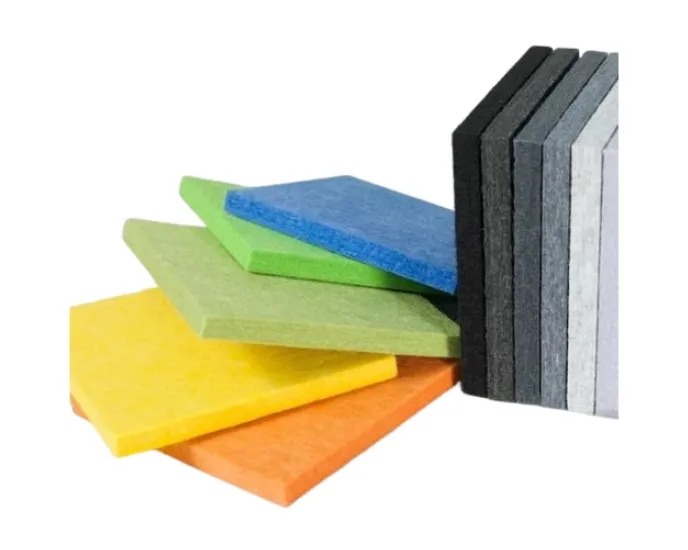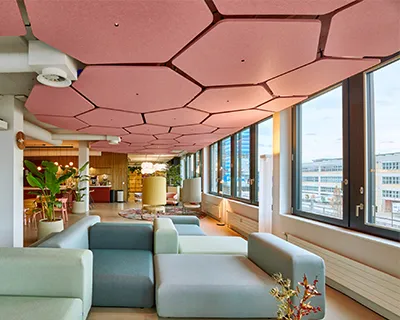Evite que su consulta sea de respuesta tardía, por favor introduzca su WhatsApp/Skype junto con el mensaje, para que podamos ponernos en contacto con usted a la primera.
Le responderemos en un plazo de 24 horas. Si para el caso urgente, añada por favor WhatsApp/WeChat:
Advertencia: Variable no definida $public en /www/wwwroot/bnpanel.com/wp-content/themes/hyhadmin/header.php en línea 243
Advertencia: Intentando acceder al offset de un array en null en /www/wwwroot/bnpanel.com/wp-content/themes/hyhadmin/header.php en línea 243
,. O llame al
Advertencia: Variable no definida $public en /www/wwwroot/bnpanel.com/wp-content/themes/hyhadmin/header.php en línea 243
Advertencia: Intentando acceder al offset de un array en null en /www/wwwroot/bnpanel.com/wp-content/themes/hyhadmin/header.php en línea 243
directamente.
Rooms echo, people strain to hear, and meetings drag. Hard surfaces bounce sound waves everywhere, pushing noise levels up. An acoustic panel made from PET felt absorbs reflections so spaces sound clear and calm.
An acoustic PET panel is an acoustic panel made from polyethylene terephthalate (PET) felt—often made from recycled plastic bottles—that is engineered to absorb sound y reduce noise. These lightweight felt panels mount on walls and ceilings or hang as ceiling baffles y suspended panels a reduce noise levels, improve speech intelligibility, and boost acoustic quality en office environments, schools, and homes.

acoustic pet panel and pet felt acoustic panels
PET felt is a dense nonwoven made from pet plastic fibers—panels are made by bonding polyester fiber under heat and pressure into rigid sheets. Many paneles para mascotas are made of recycled content and sometimes directly from recycled plastic bottles. This is both durable and long-lasting.
From our factory floor in China, we manufacture both PET and wood acoustic panel systems for global B2B buyers. As a direct manufacturer, we control fiber blend, density, and finish to guarantee consistent acoustic performance and finish quality across a variety of applications.
Why PET? It’s stable, safe, and widely recycled. The EPA reports meaningful recycling streams for PET containers, and research shows recycled PET fibers can deliver effective sound absorption across mid–high frequencies.
A pet acoustic panel converts the energy of sound waves into tiny vibrations within its fiber network. The friction inside the fibers turns that energy into heat so reflections fade. In simple terms: the panels help to reduce noise and echoes, minimize echoes at talk frequencies, and improve sound quality in the room.
When you line an acoustic wall or acoustic ceiling surface with PET felt, you’re improving the acoustic quality by shortening reverberation time. That added sound control raises intelligibility for speech and reduces ambient noise.
Ceilings are prime real estate for sound-absorbing materials.
Each format is easy to install, modular, and designed to help you tune the acoustic quality of a space without heavy construction.
Explore PET ceiling formats: Paneles de lamas de PET for rhythmic baffle looks and Paneles acústicos decorativos de PET for graphic ceilings.

PET acoustic ceiling options
At the polymer level, PET is polyethylene terephthalate. As polyester, it forms a stable, lightweight matrix that’s highly efficient at trapping air and resisting sag. That makes PET ideal for acoustic design, especially where weight and code compliance matter.
Peer-reviewed studies have tested PET and recycled PET fibers for absorción acústica; the finding is that engineered fiber diameter, thickness, and density correlate with mid-band absorption—just what speech bands need.
Open-plan offices look great but they often suffer low speech intelligibility due to long reverberation and direct paths. PET acoustic panel arrays can create quiet zones in meeting rooms, conference rooms, and circulation open spaces.
Recent studies confirm that sound masking plus absorption improves speech intelligibility and privacy in open work layouts. Use PET baffle runs above benches and clusters of wall tiles to catch early reflections and reduce noise across the floor.
We guide specifiers using three plain-English metrics:
A quick rule of thumb: treat 20–30% of major reflection areas with PET acoustic panel coverage to reach meaningful improvement in office environments and classes. This move alone can enhance the acoustic comfort across teams and client areas acoustically.
Mini comparison (illustrative):
| Material (25 mm) | Typical Use | Absorption @ 1 kHz (indicative) |
|---|---|---|
| PET Felt Sheet | Walls / suspended panels | High (great for talk band) |
| Foam Tile | Studios, booths | Medium–High |
| Wood Slat + PET | Característica wall panel | Medium–High |
(Values vary by density, thickness, and mounting air gap.)
PET acoustic panels come en various shapes—hexagons, slats, planks, and tiles—so they fit many interior designs and branding schemes. With a wide range of colors, you can match furniture and wayfinding.
Nuestra panels come in multiple thicknesses, edge profiles, and modules; with our factory tooling, we cut logos or patterns. For accents, pet felt can also be CNC-engraved into ridges that trap sound waves and create colors and styles that architects love. Try hex tiles or slats to enhance the acoustic vibe of the space while keeping it fresh and modern.
See design-forward options like Paneles PET hexagonales y Paneles de PET con ranura en V grabados.

Design choices
PET acoustic panel substrates are often made from recycled content. Many product lines disclose recycled percentages for leed documentation, and PET streams are among the clearest recycling pathways in plastics.
We keep additives low and offer options with negligible volatile organic compounds to protect air quality. Re-use and recyclability reduce waste. PET’s long service life cuts replacements and supports residential and commercial sustainability narratives.
PET recycled plastic content and chain-of-custody reporting are available at quote stage; confirm local recycling guidance since streams vary by region.
Compared with many rigid absorbers, PET acoustic panel systems are cost-effective, easy to maintain, and easy to clean with a soft brush or vacuum. The benefit of using PET is that you can reconfigure panels when layouts change—ideal for growth.
They are also long-lasting y soundproof is not the right promise—absorption ≠ isolation—but PET delivers superior sound clarity indoors by catching reflections where it matters most.
Browse our paneles acústicos de fieltro para mascotas and compatible systems: Paneles acústicos de fieltro PET, Paneles acústicos de poliéster PET, and Paneles acústicos de fibra de poliéster.
As a professional manufacturer in China, we cut, bond, edge-finish, and pack every acoustic panel order to your spec. Need fast-track? We maintain baseline sheets in popular sizes so panels are made and shipped quickly. For global rollouts, we standardize SKU codes to simplify replenishment.
We ship worldwide with labels and drawings so installers can get started quickly. Modules are easy to install, and panels help you hit your acoustic comfort targets with minimal downtime in the work environment.
Thickness & mounting
Colors & finishes
Compliance & safety
Where it fits
A. Open office retrofit
Problem: open-plan bullpen had poor speech intelligibility and glare.
Fix: 25 mm PET suspended panels above clusters + wall tiles behind monitors.
Result: noticeable drop in reverberation; fewer complaints and clearer calls. (Studies align with these outcomes in comparable workplaces.)
B. Meeting suite refresh
Problem: New glass interior designs looked great but meetings sounded harsh.
Fix: PET slat feature wall panel and perimeter baffle run.
Result: better sound quality, higher meeting satisfaction scores.
For examples in context, see Paneles acústicos de fieltro PET y Paneles acústicos decorativos de PET.
What is an acoustic PET panel made of?
A PET acoustic panel is a rigid sheet made from recycled recycled plastic—primarily polyethylene terephthalate—formed into sound-absorbing felt. Many lines disclose recycled content by weight and support LEED reporting.
Can PET panels help in glassy meeting rooms?
Yes. PET tiles and baffle runs designed to help reduce noise levels, cut flutter echo, and lift speech intelligibility so calls feel clear. They’re ideal where glass and concrete dominate.
Do PET panels emit odors or chemicals?
We supply low-VOC options; always check certificates to minimize volatile organic compounds in sensitive spaces.
Are PET panels only for walls?
No. Use acoustic felt wall panels on walls and PET ceiling baffles or suspended panels overhead. This two-layer strategy boosts coverage without clutter.
How many colors are available?
Plenty. Our sheets come in a range of colors and textures, so designers can specify consistent palettes across floors and continents.
What’s the difference between PET felt and foam tiles?
Foam works well in booths; PET felt is tougher, repositionable, and easier to detail. It’s also simpler to keep uniform across multi-site rollouts.
| Attribute | Typical PET Panel | What it means |
|---|---|---|
| Composition | PET polyester felt (panels are made from RPET content) | Lower weight, robust edges |
| Espesor | 9–24–50 mm | Thicker = deeper mid-low absorption |
| Mounting | Glue, Z-clips, grid (drop ceiling), cable kits | Flexible install & reconfig |
| Maintenance | Vacuum/brush, easy to maintain | Low lifetime cost |
| Durability | Scuff-resistant, long-lasting | Good for high-traffic |